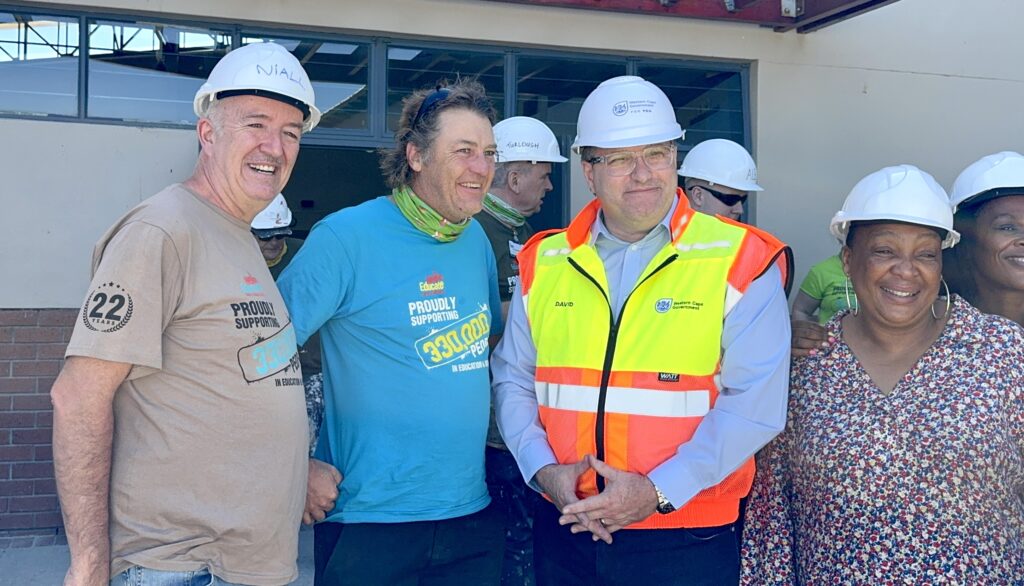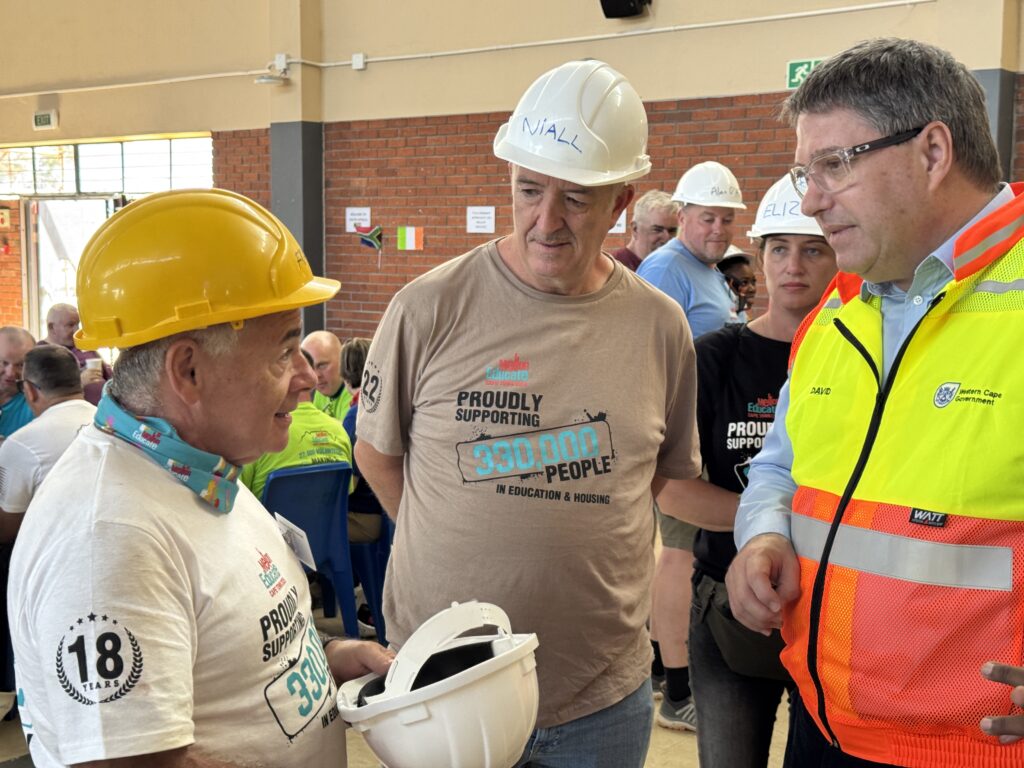Western Cape MEC for Education, David Maynier, applauds the collaboration with Mellon Educate
South Africa, 19 November 2025 – As South Africa faces a national literacy emergency with more than three quarters of Grade 4 learners unable to read for meaning, 450 volunteers, teachers, and community members have come together this week to take on one of the country’s greatest challenges: teaching children to read and giving them the tools for a better future.
Mellon Educate, the international charity founded by Irish philanthropist Niall Mellon, is best known for building housing for 250,000 of South Africa’s most vulnerable families. This week, on the dusty school grounds of Cape Town’s townships, Mellon Educate’s 2025 Building Blitz is underway, the organisation is building literacy, brick by brick, classroom by classroom, including dedicated Literacy Hubs created for one-to-one tutoring and digital learning environments.
Western Cape MEC for Education, David Maynier, attending the event, said, ” We are very proud of this strong partnership with a school, Mellon Educate, and the Department, all mobilising around a common goal to improve literacy.”
The numbers driving this mission are sobering. According to the Progress in International Reading Literacy Study (PIRLS 2021), 81 percent of South Africa’s Grade R to Grade 4 learners cannot read or write for meaning. In the poorest schools, that number rises to nearly 90 percent. Without literacy, there can be no learning, no skills, and no opportunity. Literacy is the foundation of a competitive workforce. By ensuring every child can read by Grade 4, we unlock pathways to skills, employment, and economic resilience.
Building the Foundation of a Nation
Through its expanding Literacy Hub programme, Mellon Educate aims to reach one million children across the country by 2035, establishing 600 community-based hubs and employing 10,000 young literacy tutors. The model delivers measurable results: independent evaluations show literacy scores improving by 40 to 50 percent in one year.
“We’ve always believed in South Africa’s potential, but potential needs tools. Reading is that tool,” said Niall Mellon, Founder of Mellon Educate. “You can’t build a country if its children can’t read. For us, this is the next phase of nation-building; Bricks to Books. Every Literacy and Digital Hub we open is a cornerstone for South Africa’s future.”



South African corporates have both the ability and responsibility to help solve the literacy crisis by financing these types of initiatives.” Mellon added. “By supporting literacy today, companies are investing in the country’s future workforce and building the talent pipeline that will drive tomorrow’s economy.
The programme’s impact extends beyond literacy by harnessing South Africa’s unemployed youth to solve the literacy crisis. 90 percent of Mellon Educate’s tutors were previously unemployed, turning the initiative into a job-creation engine for local youth. In addition, three years ago, Mellon Educate were ahead of the curve, introducing AI technology and completing a number of monitoring and valuation studies, demonstrating the willingness of teachers to embrace AI as a way to help solve the literacy crisis.
Government and Community United
The initiative has the support of the Western Cape Education Department and aligns with President Ramaphosa’s Basic Education Employment Initiative (BEEI), and part of the national strategy to improve early-grade reading outcomes, declaring at the Department of Basic Education Lekgotla, earlier this year: “Not having mastered basic skills in reading and maths at foundation level sets the tone for how a learner will perform in high school and beyond. So, correcting these shortcomings is the most urgent of tasks. It must be front and centre of our efforts in basic education.” Mellon Educate’s Literacy Hub model aligns with the government’s District Development Model, creating jobs, improving education outcomes, and fostering inclusive economic growth at the community level.
At ACJ Phakade Primary School in Lwandle in the Strand, one of the 2025 Blitz sites, classrooms that once stood broken are now full of colour, books, and sound.
Acting principal Mandisa Lehoke, watching a group of children sound out words together, added, “Mellon Educate has built a solid foundation for my school – it will not only give them quality teaching but, most importantly, quality learning.”
A Movement Born from Hope
This year’s Building Blitz is a collective act of hope. The 450 volunteers from South Africa, Ireland, the UK, and beyond, have arrived to build and teach side by side with local communities. The energy is contagious. “When you walk through a site like this, you feel the heartbeat of what South Africa can be,” added Mellon. “This isn’t charity. It’s shared humanity. The Blitz is living proof that when we work together – government, business, and citizens – we can move the dial on the things that matter most.”
The Literacy Hub model’s dual focus – literacy and livelihoods – positions it as one of South Africa’s most innovative responses to the education crisis. It blends volunteerism with sustainability, pairing early-grade learning with youth employment and community empowerment.
The Human Story Behind the Statistics
Moments of real, tangible learning are what the Blitz is built around; visible, emotional proof that progress is possible. Each photo, each sound clip, each interview tells the story of a country learning to believe again.
The Long View
Since its founding, Mellon Educate has mobilised over 36 schools and 100,000 children. Today, its Literacy Hubs serve more than 4,000 children across 17 schools, supported by the Western Cape Education Department.
The organisation’s next target is expansion into the National Programme with national partnerships under development to scale the model across nine provinces.
“We can’t wait for someone else to fix it,” Mellon concluded. “We’re already doing it, one reader at a time. South Africa’s story is still being written, and it starts with a child learning to read, and it is amplified by South African businesses jumping in. We need your help,” he urges.
FACTS AT A GLANCE
● 81% of Grade 4 learners in South Africa cannot read for meaning (PIRLS 2021).
● Mellon Educate’s Literacy Hubs improve literacy by 40–50% in one year.
● 36 schools and almost 100,000 children reached (and counting)
● 90% of tutors were previously unemployed.
● Target: 1 million children, 600 hubs, 10,000 tutors.
● Supported by the Western Cape Education Department & President Ramaphosa’s BEEI.
To submit a release, contact us here.


